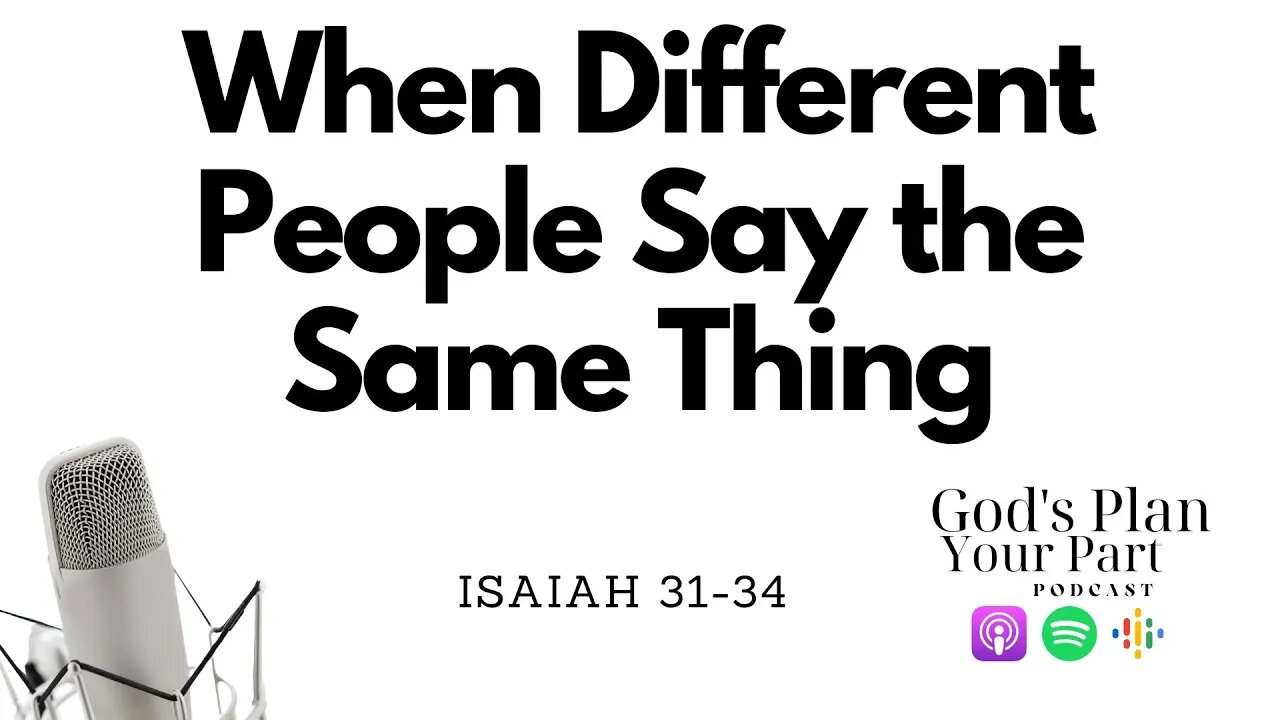Premium Only Content

Isaiah 31-34 | Different Voices, Same Message
In Isaiah 31, the prophet warns against relying on human strength, urging the people of Judah not to seek aid from Egypt's chariots and horsemen, but to trust in God's deliverance. The Lord, as the fierce lion, will come to defend Zion and protect His people. Those who repent and turn back to Him will receive His mercy and forgiveness, but those who persist in rebellion will face His judgment.
In Isaiah 32, Isaiah prophesies about a future righteous ruler who will bring stability and prosperity to the land. He will protect the vulnerable and create an environment of peace. The Holy Spirit will be poured out, resulting in a fruitful and bountiful land. Justice and righteousness will prevail, contrasting the consequences of wickedness and complacency.
Isaiah 33 reveals a prayer for God's mercy and salvation in the face of impending destruction. The Lord is exalted and will be the ultimate source of deliverance. The enemies' plans will fail, and their plunder will be turned against them. The righteous will dwell in safety, experiencing God's forgiveness and protection.
In Isaiah 34, a prophecy of God's judgment on the nations unfolds. The entire earth is summoned to witness the Lord's wrath and vengeance against the wicked. The land will be desolate, and His sword will be bathed in blood. It will become a place of horror and chaos, a fitting punishment for the nations' sins.
Throughout these chapters, Isaiah emphasizes the themes of repentance, divine intervention, judgment, and salvation. He calls for trust in God, warns against relying on human power, and presents a vision of hope for a righteous ruler who will bring peace and prosperity. The prophet reminds the people of the consequences of rebellion and wickedness, while offering the promise of God's forgiveness and protection for those who turn to Him in sincerity and humility.
The prophets Isaiah, Micah, Amos, and Hosea were contemporaries who lived during a similar time in the history of Israel and Judah. They all delivered messages from God to the people of their respective nations, and while their styles and specific focuses varied, there were common themes and warnings that they shared. When multiple voices echoed similar messages, it often signified the significance and urgency of the message, making it even more worthy of attention.
The repetition and alignment of these key messages from different prophets underscored the seriousness of the issues at hand and emphasized God's desire for His people to turn back to Him. It showed that the situation was critical, and God was giving multiple opportunities for repentance and change. Their collective messages serve as timeless reminders for humanity to heed God's call for righteousness, justice, and faithfulness.
-
 14:39
14:39
Gods Plan Your Part
2 months agoTitus 1 | Paul’s Blueprint for Faithful Leaders
391 -
 2:58:21
2:58:21
xBuRnTx
10 hours ago1st Warzone Stream Online
48.9K2 -
 6:10:21
6:10:21
JdaDelete
1 day ago $12.44 earnedDino Crisis - Sega Saturday
106K4 -
 23:22
23:22
MYLUNCHBREAK CHANNEL PAGE
1 day agoUnder The Necropolis - Pt 5
91.5K52 -
 2:26:11
2:26:11
Jewels Jones Live ®
2 days agoWINNING BIGLY | A Political Rendezvous - Ep. 108
150K45 -
 2:04:49
2:04:49
Bare Knuckle Fighting Championship
4 days agoBKFC FIGHT NIGHT MOHEGAN SUN FREE FIGHTS
77K7 -
 25:09
25:09
BlackDiamondGunsandGear
13 hours agoYou NEED to be Training For Whats to Come
53.1K11 -
 20:03
20:03
Sideserf Cake Studio
19 hours ago $1.85 earnedA HUNGRY HUNGRY HIPPOS CAKE THAT ACTUALLY WORKS?
49.4K14 -
 23:51
23:51
marcushouse
20 hours ago $1.67 earnedStarship’s Next Move Is Coming Sooner Than You Think!
36.1K6 -
 22:24
22:24
The Finance Hub
1 day ago $11.76 earnedBREAKING: JOE ROGAN JUST DROPPED A MASSIVE BOMBSHELL!!!
39K36